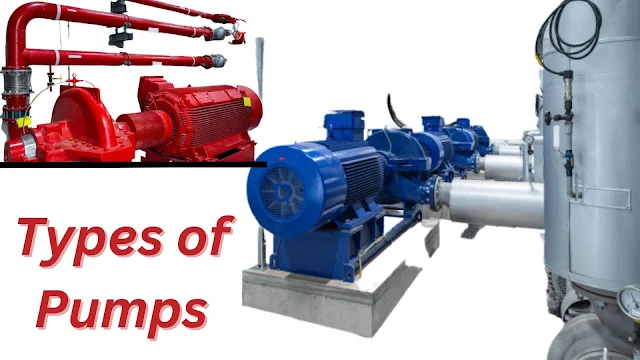A pump is a device used to increase a fluid's pressure energy. A liquid pump generally lifts a liquid from a lower level to a higher level. So pumps do some work on the fluid, and to do the work, energy is supplied from an external source. That is the pump is required to be driven by an electric motor.
Types of Pumps
Pumps are classified as follows or pumps are two types (i) Positive displacement Pump and (ii) Dynamic Pressure Pump.
Also Read: Centrifugal Pump Construction, Working, Advantages, and Disadvantages
(i) Positive Displacement Pump
A positive displacement pump has an expanding fluids cavity on the suction side of the pump, and a shrinking fluids cavity on the discharge side of the pump. The pumped fluids flow Inlet the hole as the suction side expands and the outlet as the discharge cavity contracts.
It is divided into the following subcategories
(a) Reciprocating Pump
Positive displacement in the reciprocating pump is done by moving its piston back and forth or up and down. It is classified as
(i) Piston Pump (ii) Plunger Pump (iii) Diaphragm Pump
(b) Rotary Pump
Positive displacement in a rotary pump is achieved by its friction motion. It is classified as follows.
(i) Gear Pump (ii) Mano Pump
(ii) Dynamic Pressure Pump
The pressure of the fluid is obtained by this pump by its motion. these are two types
(a) Centrifuged Pump
In a centrifugal pump, the lifting column of liquid is obtained by centrifugal force. It is classified as follows.
(i) Valute Pump (ii) Turbine Pump
(b) Propeller Pump
In the Propeller Pump, the lifting column of the liquid is obtained by the vane of the propeller. The propeller pump is the opposite of the coupling pump.
Also Read: Reciprocating Pump Working, Construction, and Uses
Calculate the horsepower of a Pump
Finding horsepower of pump: Considered for a reciprocating pump.
Hs = suction head of the pump
Hd = delivery head of a pump
dt = discharge received from the pump
W = volume density of liquid
Then the work done by the pump (per minute) = wф(Hs + Hd) kg/mm
Hours Power of Pump = W ф(Hs + Hd)/4500

